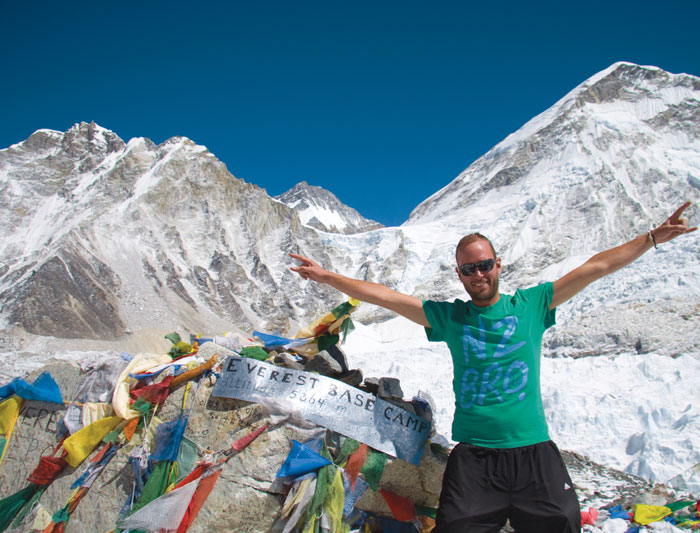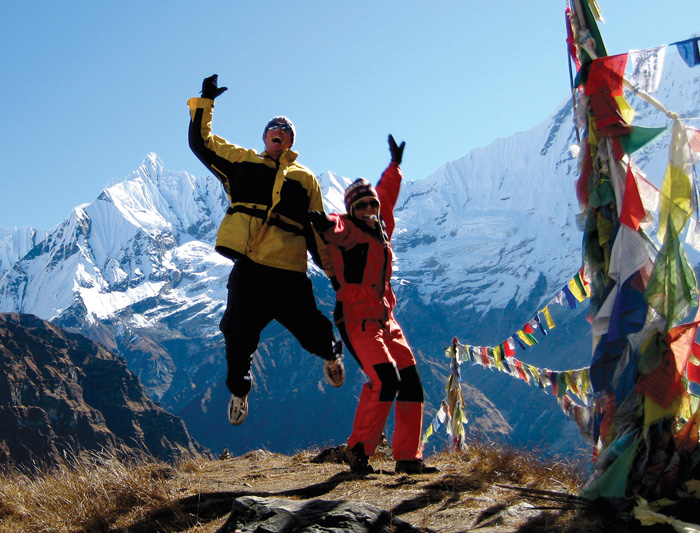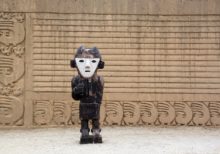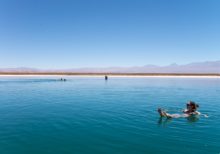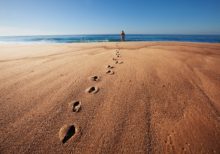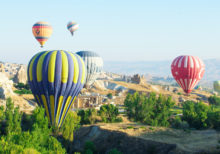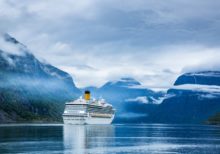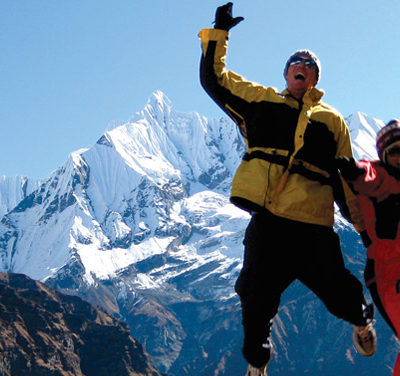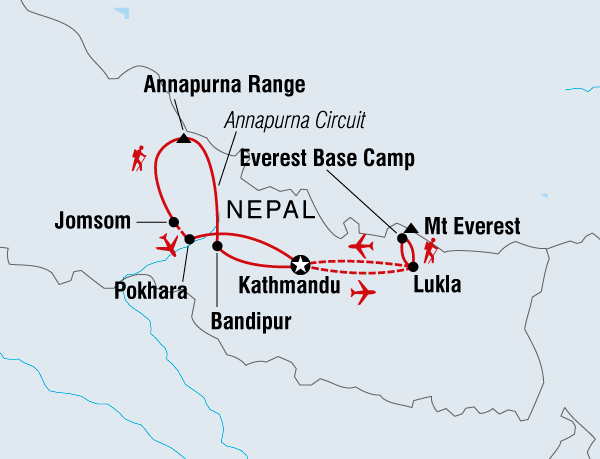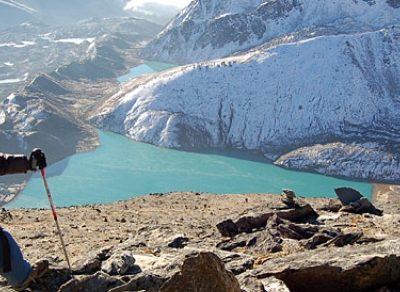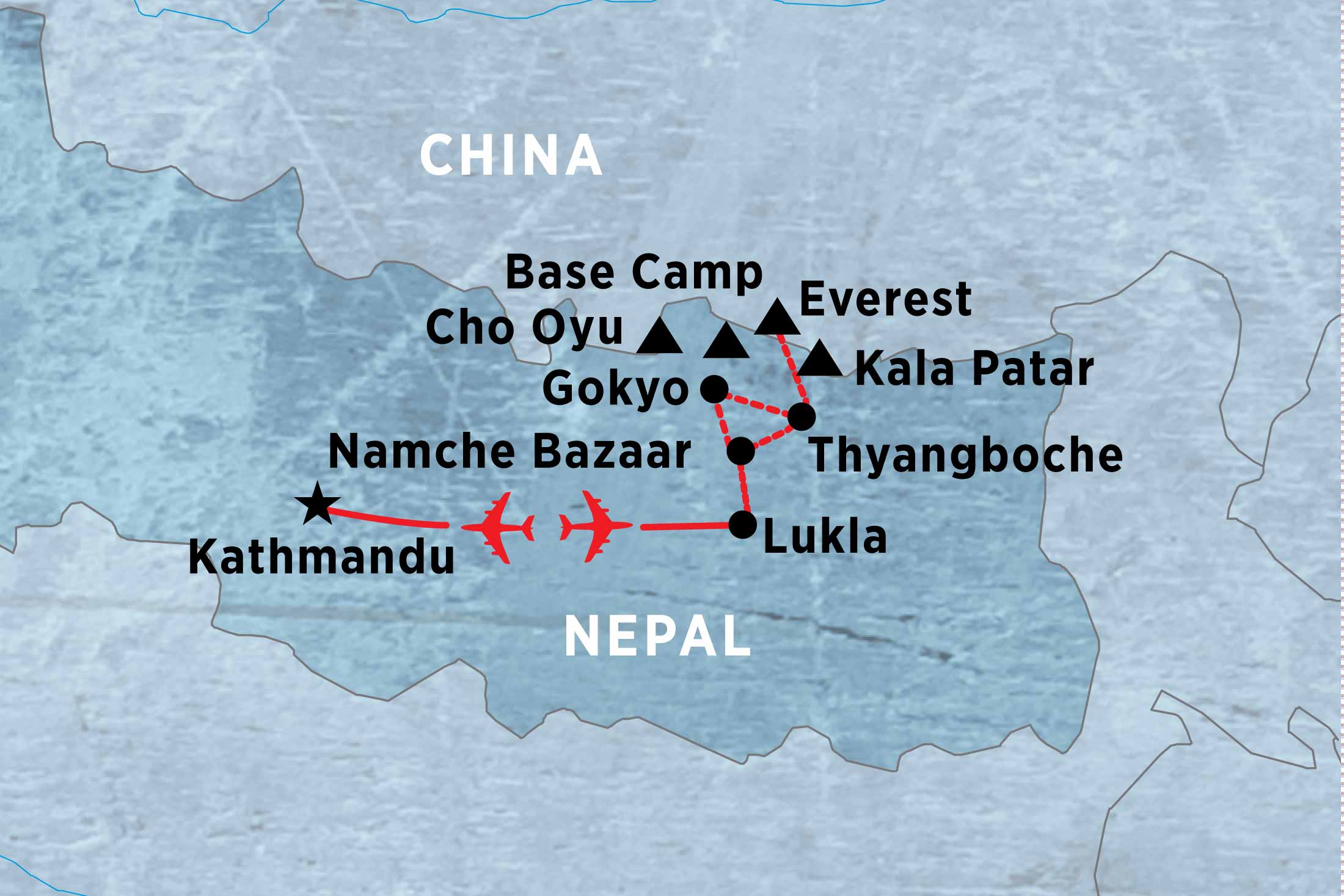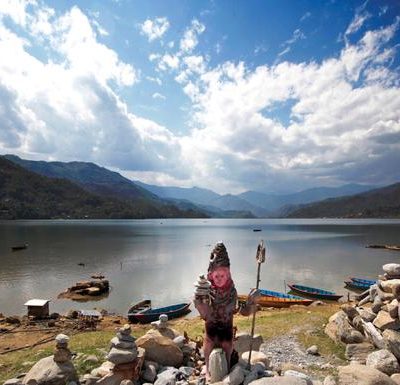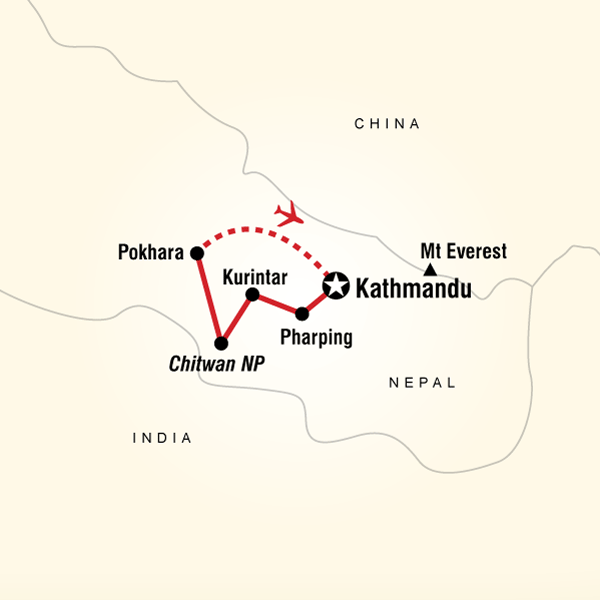| Starts | Kathmandu, Nepal |
|---|---|
| Ends | Kathmandu, Nepal |
| Region | Nepal |
| Duration | 15 days |
| Tour Operator | Intrepid Travel |
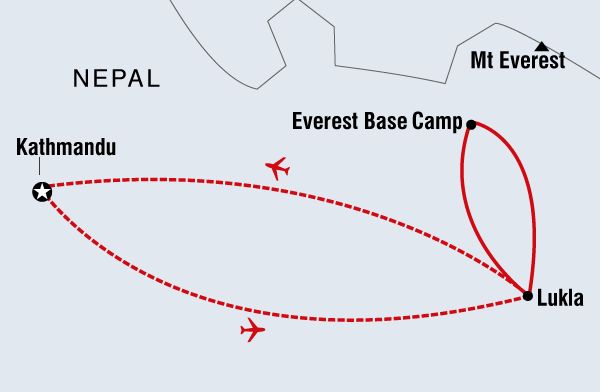
Itinerary
Day 1 - Starting: Kathmandu & Finishing: Kathmandu
Namaste! Welcome to Nepal. Please arrive by 14:00 on Day 1 as we will have an important group briefing. Your leader will leave a note at reception telling you where and when this important meeting will take place. Please ask a member of reception for this information. Kathmandu, the colourful capital of Nepal, is a fascinating blend of traditional architecture and symbols of the 20th Century. Its rich artistic and cultural heritage is evident where ornately carved balconies mingle with beautiful shrines and temples. If you arrive early we recommend you check out Durbar Square with it's temples, markets and busy atmosphere. It is also worth the climb to visit the Swayambhunath - the 'monkey temple'. Explore the network of street markets and alley bazaars and Pashupatinath. For those with a few extra days in Kathmandu, the neighbouring towns of Patan and Bhaktapur are well worth a visit.
Day 2 - Starting: Phakding (2610 m) & Finishing: Phakding (2610 m)
Sitting at 8848 m Mt Everest, the highest peak in the world, is one of the greatest trekking destinations. Locally known as Sagarmatha, the mountain has long been revered as the home of the gods. First conquered by Tenzing Norgay and Sir Edmund Hillary in 1953, Everest has traditionally been the ultimate goal for mountaineers. On this trip you will take on the challenge of reaching the mountaineer's base camp and gain an insight into the world famous Sherpa culture. You will cross glaciers and broad plains, traverse valleys and climb high passes to reach the picturesque Everest Base Camp. Our accommodation comprises small, basic teahouses along the track. These basic but cosy remote houses are operated by the mountain Nepalese to cater for trekkers and also offer simple yet filling and delicious meals to sustain our efforts. This is a challenging trip and involves difficult trekking at high altitudes but the whole experience is simply awe-inspiring! This is a trek that requires an excellent level of fitness as there are plenty of ascents and descents and the walking is very strenuous. The weather can be harsh in December and January, with a combination of snow and frosts. This trip includes one or more overnight stays over 3500 metres/11500ft, where there is a genuine risk of being affected by Acute Mountain Sickness (AMS). If left untreated AMS can be life-threatening. We would expect the majority of a group to notice the effects of being at high altitude, and while most will only feel discomfort, it is not uncommon for a small number of people to need extra care which will be provided by our leaders and local staff. All our trips that spend time at High Altitude follow our standard altitude safety measures. A number of medical conditions or medications can also reduce your body's ability to acclimatise, and thus will affect your performance at altitude and make you more susceptible to AMS. If you are worried about any pre-existing condition (e.g. heart problems), or unsure of your physical ability, you must seek medical advice prior to booking. You may also wish to discuss medication such as Diamox that may help aid acclimatisation. Please note that while we endeavour to assist all our clients in achieving their goals, there may be times your leader makes the decision to either delay or stop your ascent based on your medical conditions and AMS symptoms. This trip is lead by an experienced English speaking local guide and two assistants who help with the daily logistics. Though you are expected to help carry your gear, there are porters provided to assist. The itinerary is subject to change due to weather conditions or any other factors outside of Intrepid's control. On occasion due to weather conditions we are unable to fly to Lukla as planned. In these cases, you will be accommodated at your joining hotel (at your expense - you may be able to claim this on your travel insurance post tour) until the weather clears. Today we have a very early (approx. 6.30 am) flight from Kathmandu to Lukla (45 minutes). If the weather is good, the views of the Himalayas from the small plane are amazing! After breakfast in Lukla (2840 m), a short safety talk and an introduction to our porters, we gear up and commence our trek. Today is a fairly gentle introduction, following the milk-white Dudh Kosi River approximately three-hours to Phakding (2610 m). Overall altitude gain today between places we sleep is -190m.
Day 3 - Starting: Namche Bazaar (3440 m) & Finishing: Namche Bazaar (3440 m)
Today we trek 9 km to Namche (approx. 6 hours), the administrative centre of the Khumbu region. This will be your last chance to check your equipment and hire any additional gear for the high altitudes from Dingboche onwards. Namche Bazaar is also the last chance for a hot shower, yummy feast, to enjoy the local nightlife or to take to the pool hall and video parlours. Overall altitude gain between places we sleep is 830m.
Day 4 - Starting: Namche Bazaar (3440 m) & Finishing: Namche Bazaar (3440 m)
Today is an acclimatisation day where we will also visit the local museum and surrounding villages. The best way to acclimatise is to do a strenuous walk up to a high altitude then come back down to sleep. Remember - it doesn't matter how fit you are, anyone can be affected by altitude, so have a chat to your doctor before you leave to talk about the symptoms and what to expect.
Day 5 - Starting: Phortse Gaon (3810 m) & Finishing: Phortse Gaon (3810 m)
Today we trek for about 6-7 hours to cover the 9 km from Namche Bazaar to Phortse Gaon. This route offers amazing insight into the life and culture of the sherpas, and that night we stay in a village that is home to a number of sherpas who have reached Everest's summit. Looking out from Phortse Gaon, the views of Amadablam are great. Overall altitude gain between places we sleep is 370m.
Day 6 - Starting: Dingboche (4410 m) & Finishing: Dingboche (4410 m)
Climb above the tree-line and trek approximately six hours covering the distance of 8 kms to Dingboche. Overall altitude gain between places we sleep is 600m.
Day 7 - Starting: Dingboche (4410 m) & Finishing: Dingboche (4410 m)
Today is another acclimatisation day. Staying the night in Dingboche we take day hikes to Amadablam base camp, Nagarjun Hill or Chukkhung.
Day 8 - Starting: Lobuche (4900 m) & Finishing: Lobuche (4900 m)
The trek to Lobuche is about five hours and covers 7 km, bringing us close to our ultimate goal! Overall altitude gain between places we sleep is 490m.
Day 9 - Starting: Everest Base Camp (5364 m) & Finishing: Everest Base Camp (5364 m)
From Lobuche we trek to the Everest Base Camp and then back down to our lodge at Gorakshep (5140 m). Here we have astonishing views over the Himalayas. Overall altitude gain between places we sleep is 240m.
Day 10 - Starting: Kala Patar/Pheriche or Orsho & Finishing: Kala Patar/Pheriche or Orsho
Today we witness some of the Himalayas most recognisable sights. We make an early start to avoid the early morning clouds and trek to Kala Pattar (5545 m) to witness the best views of Everest, Lhotse, Nuptse and other surrounding peaks. It's a tough walking day (approx. 7 hours), and depending on how the group feels, your leader will decide where you spend the night
Day 11 - Starting: Tengboche (3840 m) & Finishing: Tengboche (3840 m)
Trek to Tengboche (approx. 4 hours), for excellent views of Amadablam and a visit to the Tengboche Monastery and the Sherpa Heritage Foundation.
Day 12 - Starting: Monjo (2860 m) & Finishing: Monjo (2860 m)
Trek downhill and out of the national park to the small settlement of Monjo (approx. 5 hours)
Day 13 - Starting: Lukla & Finishing: Lukla
This morning we descend to Lukla for the night before flying back to Kathmandu.
Day 14 - Starting: Kathmandu & Finishing: Kathmandu
Weather permitting we take a short early morning fight from Lukla to Kathmandu on day 14 (approx 45 minutes). We'll return to the Kathmandu Guest House and have free time during the afternoon for further sightseeing or shopping. Shop in some of Kathmandu's many markets for clothing, embroidery, carpets or ceramics. If shopping is not your thing, take a trip over the Bagmati River to the adjacent city of Patan, with its abundance of temples and monasteries. We enjoy a final night together, reliving the trek and our extraordinary achievements. Note - If there is bad weather or low cloud conditions our flight back to Kathmandu may not go, giving us an extra day in Lukla to relax or do a day walk. In this case, we will return to Kathmandu by late morning on day 15 and the trip will end with an arrival transfer back to our hotel.
Day 15 - Starting: Depart & Finishing: Depart
Day 15 is departure day and we say 'Namaste' for memories that will last a lifetime. There are no activities planned for today and you are able to depart the hotel at any time. Check out time from the hotel is at 12 noon. If you are departing later, you can arrange luggage storage at the hotel. At the end of your tour please consider donating to the KEEP Porters Clothing Bank. As you will have come to realise on your tour, porters play a vital role in the tourism industry enabling tourists to visit Nepal’s most picturesque and difficult terrain. The majority are subsistence farmers who travel from lower areas of Nepal to the higher elevated trekking routes to find employment. Contrary to the belief that porters are well-adjusted to the cold and altitude of the Himalayas, every year many porters suffer from a variety of illnesses such as altitude sickness, snow blindness, hypothermia and frostbite and some even die as a result. The Clothing Bank was set up in 2009 to provide ill-prepared porters with better clothing suitable for trekking in a mountain environment and reduce the number of unnecessary illnesses and fatalities which occur each year. Usually donations of used jackets and trousers/pants from Westerners do not fit Nepali porters who tend to be smaller. However donations of other clothing items such as socks, boots, sunglasses, warm gloves and sleeping bags are always welcome. Your leader can ensure that your donation is passed on.
View Dates

